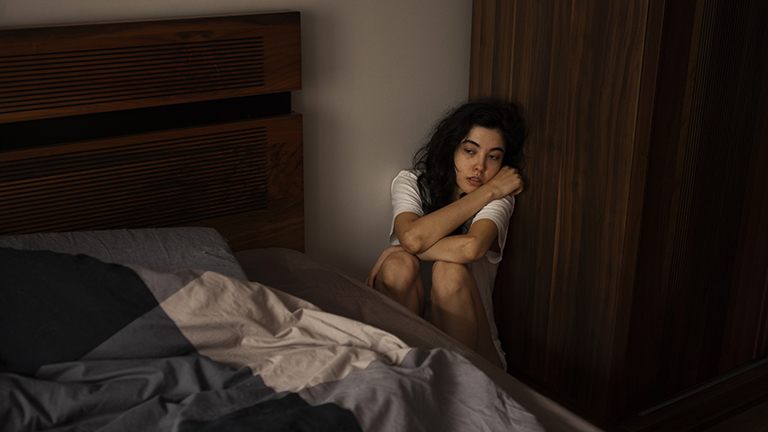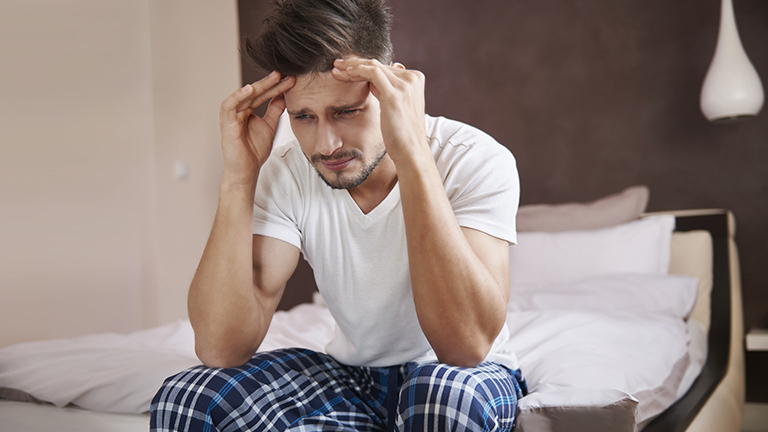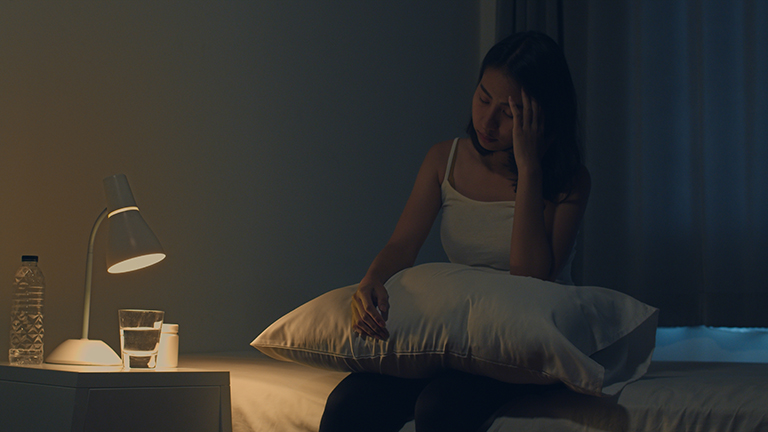Nighttime anxiety is a common issue affecting millions worldwide, making it difficult to unwind and fall asleep. While daytime stressors are often manageable, the quiet and solitude of nighttime can magnify anxious thoughts, leading to restless nights. Learning how to stop anxiety before bed is essential not only for better sleep but also for overall mental health. Anxiety before bed can manifest as racing thoughts, tension in the body, or an inability to relax, all of which disrupt natural sleep cycles.
Sleep is crucial for mental restoration, emotional regulation, and physical recovery. Chronic anxiety before bedtime can lead to sleep deprivation, which in turn exacerbates stress, creating a vicious cycle. Understanding why anxiety intensifies at night is the first step toward effective solutions. This article will guide you through natural techniques, lifestyle changes, and professional interventions that can help you achieve peaceful sleep.
Common Causes of Anxiety Before Bed
Anxiety before bed can arise from various factors. Overthinking about unresolved problems, work stress, financial concerns, or personal relationships can dominate the mind as you try to sleep. Biological factors, including hormonal imbalances, low serotonin levels, and irregular circadian rhythms, may also contribute to nighttime anxiety. Additionally, lifestyle habits such as excessive caffeine intake, late-night screen exposure, and poor sleep hygiene can intensify anxious feelings.
Environmental factors, such as a noisy bedroom or uncomfortable sleeping conditions, can further prevent relaxation. Understanding the root causes allows individuals to implement targeted strategies for relief. Recognising triggers is an essential step in learning how to stop anxiety before bed.
Why Anxiety Peaks at Night
Anxiety often feels worse at night due to the absence of daytime distractions. During the day, work, social interactions, and activities occupy the mind, leaving little room for obsessive thoughts. However, when the world quiets down, unprocessed emotions and worries resurface. Cortisol levels, which help regulate stress during the day, naturally decrease in the evening, sometimes leaving a heightened sense of vulnerability.
Additionally, the body’s natural circadian rhythm can affect emotional regulation. People who are prone to overthinking may notice that racing thoughts intensify as they attempt to sleep, making nighttime one of the most challenging periods for anxiety sufferers.
[INSERT_ELEMENTOR id=”5108″]
The Role of Stress and Overthinking Before Bed
Overthinking is one of the most common contributors to anxiety before sleep. Individuals often replay stressful events, worry about future obligations, or imagine worst-case scenarios. This mental activity triggers the brain’s stress response, increasing heart rate and tension in the body. Learning how to stop anxiety before bed requires breaking this cycle, redirecting attention, and calming the mind to promote restorative sleep.
How to Stop Anxiety Before Bed Naturally
There are numerous natural techniques to reduce nighttime anxiety, ranging from mental exercises to physical relaxation methods. Incorporating these strategies into a consistent bedtime routine is key to success.
Breathing Exercises for Relaxation
Deep breathing exercises help activate the parasympathetic nervous system, signalling the body to relax. Techniques such as diaphragmatic breathing, box breathing, or the 4-7-8 method can lower heart rate, reduce stress hormones, and ease the mind. Practising breathing exercises before bed allows for a smoother transition from wakefulness to sleep, ultimately teaching the body and mind that it is safe to rest.
The Power of Mindfulness and Meditation
Mindfulness and meditation are powerful tools for combating nighttime anxiety. By focusing attention on the present moment, individuals can interrupt cycles of worry and overthinking. Guided meditation apps, body scans, and mindfulness exercises are effective in helping the mind release tension and prepare for sleep. These practices not only reduce anxiety but also improve overall sleep quality.
Foods and Drinks That Affect Nighttime Anxiety
Diet plays a significant role in mental health and sleep. Consuming caffeine or sugar close to bedtime can increase anxiety and make it difficult to fall asleep. Conversely, certain foods and beverages, such as chamomile tea, warm milk, or magnesium-rich snacks, can promote relaxation. Maintaining a balanced diet and avoiding stimulants in the evening is an essential step in learning how to stop anxiety before bed.
Sleep Hygiene Habits That Improve Relaxation
Good sleep hygiene is foundational for reducing nighttime anxiety. Establishing a consistent bedtime, keeping the bedroom dark and cool, and limiting screen exposure in the hour before bed help regulate circadian rhythms. Turning off electronic devices and avoiding late-night work or stressful conversations allows the brain to enter a state of calm, making it easier to fall asleep naturally.
Herbal and Natural Remedies for Bedtime Anxiety
Certain herbs and supplements have been found to reduce anxiety and promote sleep. Valerian root, lavender, passionflower, and CBD are commonly used for their calming effects. While natural remedies are not a replacement for professional care, they can serve as an effective adjunct to behavioural strategies for managing nighttime anxiety.
Cognitive Behavioural Techniques for Calmer Nights
Cognitive Behavioural Therapy (CBT) techniques, especially CBT for insomnia (CBT-I), are highly effective for addressing anxiety at night. These techniques involve identifying and challenging anxious thoughts, developing structured bedtime routines, and creating positive sleep associations. Writing down worries in a journal before bed or using worry periods earlier in the day can prevent the mind from racing when lying down to sleep.
5 Practical Tips on How to Stop Anxiety Before Bed
1. Practice Deep Breathing Before Bed
Focusing on your breath can calm the nervous system and slow racing thoughts. Try the 4-7-8 breathing technique: inhale for 4 seconds, hold for 7 seconds, and exhale slowly for 8 seconds. Repeat several times to signal your body it’s time to relax.
2. Establish a Consistent Bedtime Routine
A predictable routine trains your body to associate certain activities with sleep. Activities like dimming lights, reading a calming book, or taking a warm shower each night can cue your mind that it’s time to wind down, reducing anxiety.
3. Limit Screen Time and Stimulants
The blue light from phones, tablets, and TVs can interfere with melatonin production, making it harder to fall asleep. Avoid screens for at least an hour before bed, and reduce caffeine or sugar intake in the evening to help your body relax naturally.
4. Try Mindfulness or Meditation
Mindfulness exercises, guided meditation, or progressive muscle relaxation can redirect your focus away from anxious thoughts. Even 10 minutes of quiet meditation before bed can significantly lower stress and prepare your mind for restful sleep.
5. Write Down Your Worries
Journaling can help offload racing thoughts. Spend a few minutes writing down worries or to-dos before bed. This externalises your anxiety, making it easier to let go of intrusive thoughts and fall asleep more peacefully.
| Technique / Strategy | How It Helps | Best Practices |
|---|---|---|
| Deep Breathing Exercises | Activates the parasympathetic nervous system, lowers heart rate, and reduces stress hormones | Practice 4-7-8 or box breathing for 5–10 minutes before bed |
| Mindfulness & Meditation | Redirects focus from anxious thoughts to the present moment, promoting mental calm | Use guided meditation apps or body scans; meditate 10–15 minutes nightly |
| Journaling | Offloads racing thoughts and worries onto paper, preventing bedtime rumination | Write down worries or to-do lists 30 minutes before sleep |
| Sleep Hygiene | Regulates circadian rhythm and enhances natural sleep signals | Maintain consistent bedtime, dim lights, avoid screens 1 hour before sleep |
| Herbal & Natural Remedies | Provides calming effects, eases tension and supports relaxation | Try chamomile tea, lavender, valerian root, or magnesium-rich snacks |
| Cognitive Behavioral Techniques (CBT-I) | Reframes negative thoughts, reduces anxiety triggers, and improves sleep patterns | Identify anxious thoughts, schedule worry periods earlier in the day, use structured bedtime routines |
| Relaxing Bedtime Routine | Signals the brain that it’s time to wind down, reducing pre-sleep anxiety | Include warm showers, light reading, stretching, or soothing music |
Expert Opinion: How to Stop Anxiety Before Bed
Dr. Emily Harrington, a licensed clinical psychologist specialising in sleep and anxiety disorders, emphasises that “Nighttime anxiety is a common experience, but it doesn’t have to control your sleep. Learning how to stop anxiety before bed requires a combination of behavioural strategies, relaxation techniques, and sometimes professional guidance.”
According to Dr. Harrington, one of the most effective methods is establishing a structured bedtime routine. “Your brain responds to cues. Dim the lights, avoid screens, and engage in calming activities like reading, meditation, or gentle stretching. Over time, your mind begins to associate these actions with sleep rather than worry.”
She also highlights the importance of cognitive strategies. “Many people lie in bed ruminating about future problems or past events. Writing down these thoughts before bedtime or setting aside a ‘worry period’ earlier in the evening can help reduce nighttime overthinking.”
From a physiological perspective, Dr. Harrington explains that breathing exercises and mindfulness activate the parasympathetic nervous system, lowering heart rate and stress hormones. “Even five to ten minutes of deep breathing or guided meditation before bed can dramatically reduce anxiety and improve sleep quality,” she says.
Finally, she advises that persistent or severe anxiety should be evaluated by a professional. “If anxiety consistently prevents you from sleeping or affects daily functioning, a licensed therapist can tailor strategies, such as Cognitive Behavioural Therapy for Insomnia (CBT-I), to your individual needs. Natural remedies, lifestyle changes, and structured routines often work best when combined with professional support.”
In summary, expert opinion aligns with research: managing nighttime anxiety is multifaceted. Incorporating mindfulness, relaxation techniques, sleep hygiene, and cognitive strategies is the most effective way to learn how to stop anxiety before bed and achieve restful, restorative sleep.
Final Thoughts: Building a Calmer Nighttime Mindset
Learning how to stop anxiety before bed is a journey that combines understanding, consistency, and practical strategies. Nighttime anxiety is common, but it doesn’t have to interfere with your sleep or overall well-being. By identifying triggers, practising relaxation techniques, and creating a structured bedtime routine, you can train your mind and body to enter a state of calm at night.
Incorporating breathing exercises, mindfulness meditation, and journaling can significantly reduce racing thoughts and stress. Adjusting lifestyle factors such as diet, screen time, and sleep hygiene further supports a peaceful night’s rest. For those struggling with persistent anxiety, consulting a licensed therapist or exploring evidence-based therapies like CBT-I can provide tailored solutions.
Ultimately, the key to overcoming nighttime anxiety is consistency. Small, intentional changes repeated each night reinforce your body’s natural sleep signals, helping you drift off more easily and wake up feeling refreshed. Remember, restful sleep is not just a luxury—it is essential for mental clarity, emotional resilience, and overall health. By prioritising calm, structure, and self-care, you can reclaim your nights and enjoy the restorative sleep your mind and body deserve.



